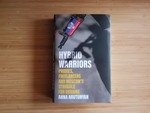On Ukrainians and Russians as 'One People'
Originally posted on the Fediverse
“Ukrainians and Russians as ‘One People’: An Ideologeme and its Genesis”, by Pål Kolstø, has been published open access last week.
It offers some context on the use of related concepts applied to Russians and Ukrainians (and Belarusians): “triune nation” (mostly Tsarist), “brotherly peoples” (mostly Soviet), and “one people” (both pre-Soviet and present).
Putin himself used all of them, but eventually seems to prefer the “one people” line: Russians and Ukrainians are just one people, i.
Who said it first? Investigating the diffusion of the Kremlin’s buzzwords before they entered the mainstream
Paper presented at the European ASN in Cluj-Napoca
On Prigozhin, and Putin's 'power vertical'
Originally posted on the Fediverse
“Wagner group chief Yevgeny Prigozhin has launched another diatribe against the Russian army. Is he a loose cannon, or a Kremlin puppet?”
https://www.theguardian.com/commentisfree/2023/jun/09/russian-armed-forces-infighting-yevgeny-prigozhin
I’m still all in the “Kremlin puppet” camp; he still has no power that is independent of the tutelage he receives from the Kremlin. Fundamentally, Prigozhin has no power base that would allow him to run a half-decent coup. He is no alternative to the Kremlin.
On mind-reading, Putin, and not so fuzzy goals
A comment posted in response to Sam Greene’s 11 February 2023 newsletter.
I feel there is good reason why Simonyan would want her audiences to believe that those goals were so fuzzy as to have no actual meaning, and hence part of a genius strategy that leaves adversaries clueless.
These goals may have been “purposefully vague”, but they still had a discernible meaning, and it’s now convenient to pretend they didn’t for obvious reasons.
Nationalist TV shows in Russia - Tsargrad.tv
[Originally posted to the Fediverse - Source]
I have looked at a full broadcast live yesterday night on (nationalist) Tsargrad TV, and rather than the outrageous quotes that inevitably emerge - and are inevitably picked up by the BBC’s great Francis Scarr - what I found more interesting was the framing, i.e. let’s talk about the issues that the authorities don’t want to talk about, as what they say does not make sense.
How hybrid warriors without a masterplan set the stage for a full scale invasion
What were the proximate dynamics that made possible what took place in the Donbas between 2014 and 2022? And what has even happened? An important part of the answer is convincingly outlined in Anna Arutunyan’s excellent latest book
On Russia's formal claim to territories it knew it wouldn't control
Originally posted to the Fediverse - Source]
One of the “big decisions” that looks puzzling in relation to Russia’s invasion of Ukraine is why did Putin decide to declare Russian sovereignty over more parts of Ukraine (Kherson and Zaporizhzhia) not when he could still hope to actually conquer them, but at a point in time when it was already evident that the Russian army could not plausibly cling to what it had, much less gain new ground.
